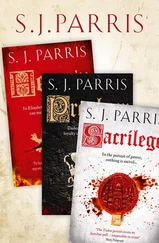‘It was greed on my part, Bruno, I confess it. But not for myself — all the money I sent home to my parents. They are poor.’ His voice rises in his own defence.
‘What money? What are you talking about?’
But at that moment a floorboard creaks outside the room; I hold up my hand and Dumas stiffens, fist to his mouth.
A soft tap at the door; another dawn visitor. I have never been so popular at Salisbury Court. I motion to Dumas to keep silent in the hope that this newcomer will think I am still asleep, but this response is apparently understood as an invitation; the door eases open and through the crack slips Marie de Castelnau, her hair unbound, dressed in a loose gown that drapes suggestively over the swell of her breasts and the curve of her hips. Her feet are bare. She widens her eyes at me and presses a finger to her smiling lips, as if we are mischievous children complicit in a game; she has not yet seen Dumas. With an implausible smile, I direct her with my eyes to where he stands, looking no less amazed than if he had witnessed the second coming. For the moment that it takes them to register the shock of one another’s presence, I am seized by the urge to laugh, but it dries in my throat at the sight of Marie’s face; she seems throttled with fury and the look of hatred she trains on Dumas threatens to burn right through him and set fire to the floorboards. Dumas, for his part, wears the expression of a man who has heated irons held inches from his privy parts. Even if my head were in better shape, I am not sure I could think of any words that would undo the implications of this moment.
Fortunately, it is Marie who gathers her thoughts first.
‘You,’ she says, folding her arms across her chest and mustering some remnants of her usual poise. ‘Shouldn’t you be on your way to help my husband? I’m sure he has plenty for you to do.’
Dumas continues to stare at her, slack-mouthed, as if she were Lucifer himself.
‘Well, go on, then,’ she says, jerking her head towards the door. ‘I’m writing a letter to a friend in Italy,’ she adds, airily, as Dumas manages to unstick his feet from the floor. ‘I wanted Bruno’s help with the translation. And it must be sent early today, because the messenger leaves this morning. You see?’ Her clipped tone aims to tidy away any potential misunderstanding. Dumas just goes on staring, stupefied, reaching the door as if in a daze. He flings me a last panicked look and backs out tentatively, as if he is unsure whether I will be safe alone with Marie. I jerk my head at him to go; better I catch up with him later.
She watches the door click shut with a small impatient shake of her head, and places her hands on her hips.
‘Why was he here at this time?’
‘Dumas? He gets homesick,’ I say, wishing my brain felt sharper. Dumas had been on the edge of a momentous confession, and Marie’s appearance had robbed me of it; now it would be impossible for me to fix my thoughts on anything until I had shaken the rest from his stammering lips. ‘Sometimes he just wants someone to talk to.’ Effortfully, I tear my gaze from the door and back to her face. Her sharp eyes assess mine for a moment, then stray to the wound on my head.
‘At this hour?’
‘Well — you are here at this hour.’
Her face softens into a sideways smile.
‘Perhaps I get homesick too. And lonely. Don’t you, Bruno?’ She seems to glide towards me, feet silent. ‘In any case, I should think my reasons are not the same as that clerk’s. What’s his name?’
‘Leon Dumas.’ Perhaps it should not surprise me that she doesn’t know the names of her husband’s staff, but it seems to confirm something about her, a lack of interest in anyone not immediately useful to her. ‘But you have a husband,’ I add, trying to keep my voice level. She stands now barely inches from me and raises a hand to my brow, her face concentrated in concern. I flinch even before she touches me, and she laughs.
‘Don’t worry, Bruno, I am not going to hurt you. Yes, I have a husband, and I can see you have never been married, if you think it a cure for loneliness.’
I clench my jaw tight as she runs a finger lightly through my hair just above the wound.
‘Courcelles said you had been attacked — I was worried about you,’ she whispers. I wonder briefly when Courcelles found the opportunity to speak to her between my late arrival and this dawn ambush, but my thoughts are scattered by the touch of her left hand on my breastbone, as her right forefinger continues to trace a line along my temple and down my face. Again, I concentrate on keeping very still, though my nerves are burning and my throat has constricted. Her gown has slipped a little and the naked slope of her shoulder is visible. ‘Bruno —‘ she begins, not quite looking me in the eye — ‘what happened yesterday —‘
‘Please — forget it happened,’ I hear myself say, in a new strangled voice. ‘There is no need to say any more about it.’
‘But this is just the problem, Bruno,’ she whispers, her breath warm on my chin. ‘I can’t forget. I can think of nothing else. I don’t know how you have done this to me.’ Her body snakes closer to me in a fluid, instinctive movement, fitting herself to the angle of my hip. Enough. My head clears as if doused by cold water; I step back and grasp her gently by the shoulders.
‘Please, Marie, I have done nothing knowingly, and you should not be here.’
‘That you have not done it knowingly makes it all the sweeter,’ she murmurs, and through her small shoulders I can feel the pent force as she strains to press herself against me, and the heat of her body. Again, I am wracked by confusion; her desire seems real enough, but I cannot shake off the suspicion that this is a performance, a trap she means to spring. Even if it is not intentionally a trap, I think, it would soon become one. I must get her out of my room before I have any cause to reproach myself.
‘Marie,’ I say gently, and she lifts her head to look me in the eye, her expression hesitant, her lips parted and breathless. Dio mio . It takes every atom of self-control I possess not to simply lean in and kiss that hot mouth. ‘This cannot be. In your heart you know it. It would only cause pain — not just to your husband, but to you and to me. Please, I implore you — try not to think of me like this, as I try not to think of you.’
She shakes her head, but at least she does take a token step back.
‘More pain than I feel already, Bruno? To see you every day, to live in the same house and eat at the same table and know that you do not want me as I want you? If there is a greater pain than this, I do not know of it.’
Because you have never known what it is to want something and not immediately have it in your possession, I think, looking at her. For her the attraction lies solely in my continuing refusal; I am not so vain as to imagine otherwise.
‘In any case,’ she goes on, averting her eyes, ‘I do not know how to live with this any longer. I begin to think that if you will not love me, then we cannot go on existing under the same roof. One of us must return to Paris.’
I run a hand through my hair and take a deep breath, trying to muster a diplomatic answer. Now she speaks of love; if she truly means this, it is nothing more than an illusion she has created in her own mind. She has persuaded herself that she loves me, because I have refused her. But then, perhaps what we call love is only ever self-delusion. And if she is acting a role, is this all part of a larger ruse to get me out of the way? If she decides one of us must return to Paris, she can only mean me, and as far as I can see, there is nothing for me in Paris except the gathering strength of the Duke of Guise and his Catholic faction, waiting to welcome the Inquisition as soon as they have the chance. I wonder who might have put her up to it; whoever has the most to gain from removing me just as the invasion plot gathers momentum. Henry Howard? The Duke of Guise himself? Whoever it is, they must not succeed.
Читать дальше
Конец ознакомительного отрывка
Купить книгу












